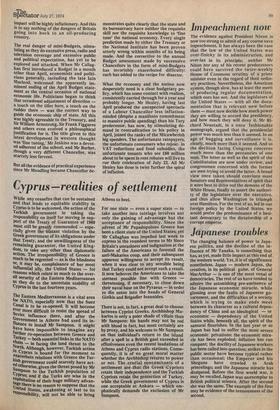Japanese troubles
The changing balance of power in Japnese politics, and the decline of the influence of Mr Tanaka, is something that has, as yet, made little impact at this end of , the western world. Yet, it is of significance nonetheless. Japan — modern Japan, the creation, in its political guise, of General MacArthur — is one of the most venal of democracies. The rest of us have tended to admire the astonishing pre-eminence of the Japanese economic miracle, while glossing over the faults of Japanese government, and the difficulties of a society which is trying to make ends meet between its character as a cultural dependency of China and an ideological — or economic — dependency of the United States while, beneath all, the spirit of the samurai flourishes. In the last year or so Japan has had to suffer the most severe economic privations: the economic miracle has been exploded; inflation has run rampant; the docility of Japanese workers has been called into question; strikes in the public sector have become typical rather than occasional; the Emperor and his Shoguns have crawled to Arab princelings; and the Japanese miracle has dissipated. Before the first world war, it may be recalled, Japan was an exemplar to British political science. After the second she was the same. The example of the first may be evidence of the tenuousness of the second.



























 Previous page
Previous page